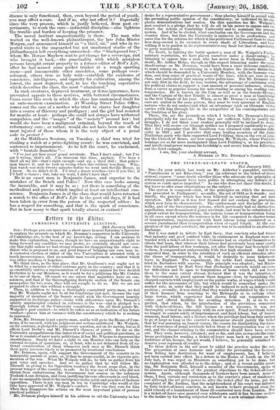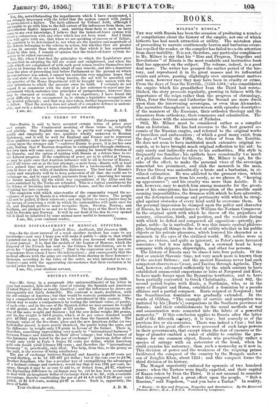THE TICKET-OF-LEAVE SYSTEM.
2let January 1866.
Sm—In your article last week on Mr. Adderley's pamphlet, entitled "Punishment is not Education," you (in reference to the ticket-of-leave system) express "some doubt whether those who advocate the principles- of reformatory punishment have been politic in attempting any defence of a system so crude and so imperfect." As one who does not share this doubt, I beg leave to offer some observations on the subject.
The system is composed—first, of the principles on which the measure was presented. to Parliament ; secondly, the act of 1863 as it stands ; and thirdly, the practice which has been followed in carrying that act into operation. The bill as it was first framed did not contain the provisions which now form its characteristic. The confinement and discipline of the hulks, and of the Government. prisons, which previously had no distinctive appellation were denominated penal servitude, rind were to be substituted to a great extent for transportation, the various terms of transportation being in all cases except where the sentence is for life commuted to shorter terms of transportation, imprisonment with hard labour being considered as a severer punishment than transportation when of equal length. At the ex- piration of the penal servitude, the prisoner was to be entitled to an absolute discharge. But it was stated in debate by Earl Grey, that convicts who had found that industry and good conduct while in confinement in England were re- warded with a ticket-of-leave in the Colonies had so exerted themselves to obtain that boon, that whereas their labour had previously been more costly than the paid labour of free workmen, yet after this hope had been held out to them ft compared not unfavourably with that high standard. And it was suggested that, in order to the retention of such an efficient stimuli's after the disuse of transportation, it would be desirable to issue tickets-of- leave in England. The experiment, the noble Earl stated, had been tried in Barbadoes with success. This principle was adopted but Minis- ters being warned by Earl Grey that discharged convicts would encoun, ter difficulties and be open to temptations at home which did not beset them to the same extent abroad, declared that it was the intention of the Government to guard against these dangers—first, by furnishing dis- charged convicts with employment on the public works, at wages which would suffice for the necessaries of life, but winch would be somewhat under the market rate, in order that they might be induced to seek an independent position ; secondly, it was stated that they would be prohibited by, the terms of their licences from resorting to the Metropolis or to certain other large towns, which experience had shown held out temptations to crime and offered facilities for avoiding detection. It is te be re- gretted, that when, by the introduction of the provisions connected with tickets-of-leave, the bill became a new measure, it was not thoroughly revised in conformity with, its new spirit. Penal servitude being no longer to consist solely of imprisonment and hard labour, but of ismn- sonment, hard labour, and a licence when the privilege hadl;ean duly earned to go at large so long as the convict's demeanour should justify the belief that herivas pursuing an honest course, the reason, for diminishing the dura- tion of sentences of penal servitude below those of transportation was at an end, and the clauses relating to the commutation should have been struck out. They were, however, retained; and so far, and also as regards the cum- brous provisions for sending a ticket-of-leave man back to prison on the forfeiture of his licenoe, the act would, I believe, be generally admitted to deserve your reproach of crudity. To these defects in the act must be added the practice under the act. The precaution at once humane and politic for preventing the licensed from falling into destitution for want of employment, has, I believe, not been carried. into effect. In a debate in the House of Lords on the 3c1 July last, it was urged on Ministers as something yet to be done, but no explanation was afforded as to the delay ; and at a recent public meet- ing, Sir Benjamin Hall, himself a member of the Government, spoke of its absence as forming one of the greatest objections to the ticket-of-leave system. Again, although thousands of licences have been issued, none of them, I fear, contain any restriction as to the convict's place of residence ; and although the act gives power to alter the ticket after its issue, yet the complaint of Mr. Jardine, that the neighbourhood of his court was infested by forty ticket-of-leave convicts, is not known to have produced even the mild remedy of a banishment of these ill-conducted men from London. Nor is a ticket-of-leave once granted ever withdrawn until it has become weleFs to the holder by his having subjected himself to a new criminal, charge. yet, Sir, notwithstanding the impediments which I have enumerated, I am strongly impressed with the belief that the system cannot with justice be pronounced a failure. The facts adduced by Colonel Jebb, although I ori unable to go with him to the full extent of his inferences from them, are nevertheless highly important ; and, uniting these facts to such as have tome to my own knowledge, I believe that the ticket-of-leave system will stand a comparison with any other which has yet been tried. And I think vou will agree with me, that when we are speaking of success or of failure, the question to be determined is, not what are the number and magnitude of tbe defects belonging to the scheme in action, but whether they are greater or less in amount than those attached to that which it has superseded. Tried by this test, I remain of opinion that the ticket-of-leave system de- serves to be called successful. But, Sir, when I find that the principles to which the Legislature gave its sanction in adopting the bill are sound and enlightened, and when the ads which are complamed of with such good reason resolve themselves into defects in framing the act which admit of easy remedy, and into a departure from the plan of proceeding laid before Parliament as the ground on which its concurrence was asked, I cannot but entertain very sanguine hopes that the real state of the case now being known, the act will be amended and the practice of the Home Department will be brought into unison with the wise intentions to which the measure owes its birth. I certainly do not regard it as consistent with the duty of a law reformer to reject any im- provement which embodies true principles of jurisprudence, however they slay be obscured or overlaid. In my own experience; I have found the great difficulty to be encountered is, to obtain a legislative recognition of the desired principle; and that step once taken, further improvement is sure to follow. That the system does not admit of a complete defence is undeni- able, and such a defence I have consequently not attempted.



























 Previous page
Previous page